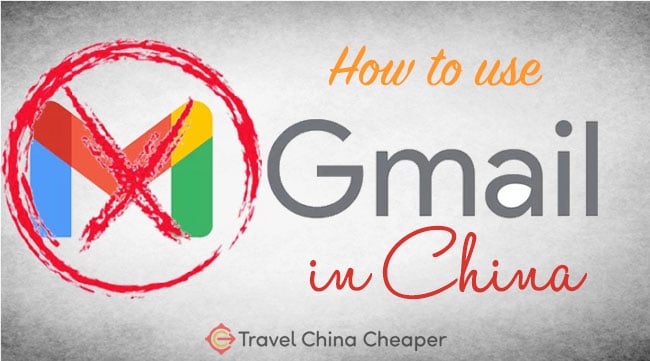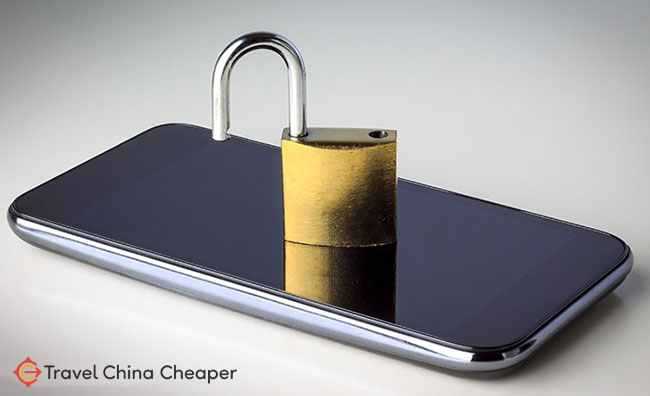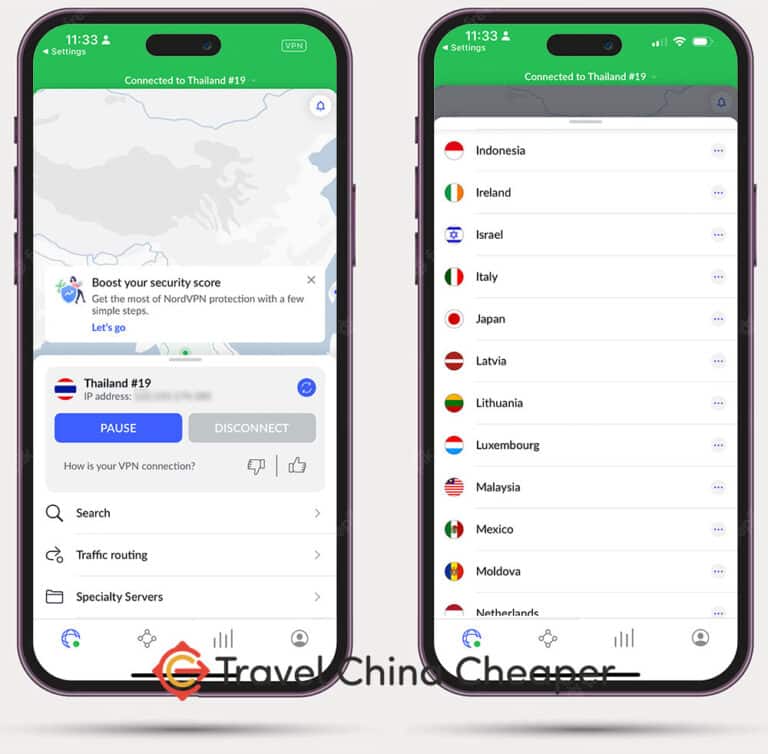Yes, it is still possible to access Gmail in China even though Gmail has been blocked since the middle of 2014. This includes pretty much any Google service you can think of. Google Docs, like Gmail, is also blocked in China. You can’t access YouTube in China, Google search, Google Maps, Google Translate and yes…you can’t even access Gmail in China. Here’s a quick explanation of what you need to know in order to access Gmail – or any email address for that matter – while in China.

Why is Gmail Blocked in China?
Gmail is blocked in China due to the country’s strict internet censorship policies, commonly referred to as the Great Firewall of China. This extensive censorship system is designed to restrict access to information and ideas that the Chinese government deems contrary to its values and culture.
When it comes to being censored within China, Gmail certainly isn’t alone. Starting in 2009, China began blocking a lot of different apps and websites including Facebook, Twitter/X and a host of different western media websites.
Since 2014, Google services, including Gmail, have been among the many websites blocked by the Great Firewall. This means that users in China cannot access their Gmail accounts without using a Virtual Private Network (VPN). The government’s aim is to control the flow of information and maintain social stability, but for expats and travelers, this creates a significant hurdle in staying connected.
A reliable VPN becomes essential for bypassing these restrictions and accessing Gmail and other Google services.
Note: This article contains affiliate links, which means that at no extra cost to you, I will be compensated if you use some of these services I recommend.
How to Access Gmail in China | 3 Easy Steps
Time needed: 5 minutes
It sounds simple enough to figure out a way to connect to Gmail in China, and for the most part it is. I’ll break it down below into 3 simple steps.
- Setup a VPN on your Phone and Computer
Before you even land in China, you’ll want to purchase and install something known as a “Virtual Private Network”, or “VPN” (I use both NordVPN and ExpressVPN here). It’s important to do this before you arrive because China makes it extremely difficult to set this up within the country (most of the VPN websites are blocked). VPN connections are crucial as they help circumvent censorship and maintain your privacy online.

- Get Access to the Internet in China
Now that you have the VPN installed, you’ll want to make sure you can access the internet once you arrive in China. You can use Wi-Fi in China, but now there are quite a few places that require text verification to access Wi-Fi. You need to either set up international roaming with your provider at home or you can arrange to rent a phone for China
- Connect to the VPN to Bypass Censorship
Now, you need to connect to a good VPN server outside of China. If you’re using something like my recommended NordVPN, it’s as simple as pushing the big “connect” button to get connected. Most of the time it connects with ease but there are times when you’ll need to troubleshoot the connection because China clamps down. This means changing servers, changing connection protocols or just trying from a different device. Once you’re connected to a VPN server, you’ll have instant access to any sort of email, including Gmail in China.
What is a VPN? A Brief Explanation
In case you’ve never heard of a VPN before, you can think of it like a tunnel through a wall (for a more detailed description, see What is a VPN?).
Even when China has censored everything and clamped down even harder after Covid, a VPN will tunnel through and allow you to experience the internet as if you were located outside China.
There’s no need to dive into the specifics of how it work, just know that a VPN is used by pretty much any expat who lives in China, including me.
I often get people who ask me “Is it legal to use a VPN in China“? It’s a legitimate question and one that I don’t take lightly when I answer it.
There have been cases where a Chinese person has gotten in trouble for using a VPN and the government talks big about blocking VPNs…and yet it all still works.
Not one foreigner has been punished for using a VPN because, frankly, the government doesn’t really care what we foreigners look at.
Choosing the Right VPN for Accessing Gmail in China
Choosing the right VPN for accessing Gmail in China is crucial, as not all VPNs are effective against the Great Firewall. The Chinese government is aggressive in blocking VPN websites and connections, so you need a VPN that can consistently bypass these restrictions. Here are some key factors to consider:
- Server Locations: Opt for VPNs with numerous server options located outside of China. This ensures better access to Gmail and other blocked sites.
- Encryption: Strong encryption is vital to protect your internet traffic from being monitored or intercepted.
- Speed: A fast VPN is essential for smooth access to Gmail, especially if you rely on it for work or communication.
- Reliability: Choose a VPN with a solid reputation and reliable connections. Frequent disconnections can be frustrating and counterproductive.
Popular VPNs known for their effectiveness in China include ExpressVPN, NordVPN, and SwitchVPN. These providers have a track record of maintaining access despite the government’s efforts to block VPN services. When selecting a VPN, make sure to read reviews and possibly test a few options to find the one that works best for your needs.
Setting Up a VPN for Gmail Access
Setting up a VPN for Gmail access is relatively straightforward, but it’s crucial to do this before you arrive in China. Here’s a step-by-step guide:
- Purchase a VPN Subscription: Choose a reputable VPN provider and purchase a subscription. Make sure the provider is known to work well in China.
- Download and Install the VPN App: Download the VPN app on your device. This could be your phone, tablet, or computer.
- Launch the VPN App: Open the app and log in with your credentials.
- Connect to a Server Outside of China: Select a server located outside of China and connect. This will route your internet traffic through that server, bypassing Chinese censorship.
- Access Your Gmail Account: Once connected, open your Gmail account and access your emails as usual.
Remember, China has restricted access to certain VPN providers, so it’s essential to identify functional and usable VPNs before your trip. Having a backup VPN can also be a lifesaver if your primary choice gets blocked.
Accessing Gmail in 2025 | Expat Tips & Hacks
In addition to the explanation above, I’d like to share with you some simple tips and hacks that I’ve learned over the years of living in and trying to use Gmail in China. Hopefully you can find some of these helpful to you.
- Notifications vs Apps: For iPhones, you’ll quickly learn that mail notifications come from a different server than your actual app information. In other words, you might get notifications of new emails to your phone even when you’re not on a VPN, but then you can’t open that email unless you’re on a VPN. Don’t be fooled: even if you use the Apple Mail app or another app to access your email, it is still blocked without a VPN.
- Get some Backup: In my experience, China has very unreliable connection when it comes to VPNs. They’ll randomly block IP addresses and sometimes it takes an hour or more for that VPN to react and make changes. In those cases, I always subscribe to at least two VPNs at a time while in China since accessing Gmail is so important to me. For me, I use and recommend NordVPN as my primary VPN and then ExpressVPN as a backup. Why? Both of them have a 30-day money back guarantee, which means that if one of them doesn’t work as well as you hoped when you arrive, you still have your backup and you can return the other one for a refund.
- Download Before You Go: As you might expect, downloading and installing a VPN while in China is quite difficult (the VPN websites themselves are usually blocked in China). It’s best to get it done before you go so that you don’t have the hassle once you arrive in country. Trust me, it’s much better this way.
- Forward Your Email: If you really don’t want to pay a little money for a VPN service, you can forward all your email to a Hotmail account or even open up a Chinese Sina account. It’s not a very professional option and it may be that Hotmail will be blocked too, but at least you can stay connected.
- Secure Your Gmail Account: Make sure you spend some time following these five steps to secure your Gmail from hackers. This is especially true when you’re accessing your email internationally.
Other Services Censored in China
In addition to Gmail, many other services are censored in China. This includes a wide range of Google services such as YouTube in China, Google Search, Google Maps, and Google Translate. Social media platforms like Facebook, Twitter, and Instagram are also blocked, along with numerous news websites, blogs, and online forums.
The broader context of internet censorship in China is aimed at controlling the flow of information and maintaining social stability. For expats and travelers, this means that accessing these services requires a bit of extra effort. Using a VPN can help you bypass these restrictions and access blocked sites, but it’s important to use a VPN at your own risk and be aware of local laws.
By understanding the landscape of Chinese internet censorship and preparing accordingly, you can ensure that you stay connected and informed during your time in China.
Final Thoughts on Using Gmail in China
It’s quite possible to use Gmail in China – and I hope you have a chance to do so! Take advantage of the NordVPN discount as soon as possible.
Take some time to make sure that you have a good VPN setup on your computer and phone before you travel to China and you should be good to go.
In the same way you access Facebook in China, it takes a little bit of creativity and a little bit of patience, but being able to get a bit of work done and stay connected to your friends and family back home can be worth the effort.









My pleasure! I’m glad you found them useful, Giovanni 🙂
Hey Steve, sorry you’re having problems but you’ll be happy to know that VPNs aren’t blocked in China. I use them every day to access the internet.
There are numerous visas to live in China – teaching, studying, working, traveling. I’ve had the privilege of having each one of those visas in my passport at one point in time over the past decade.
It’s possible! Check out my article about how to install a VPN from within China. That should answer your questions.
This is certainly possible. It’s also a security compromise, but definitely an option.
Hey Iris, it is true! And some have even said that Google Fi isn’t subject to censorship, although I get conflicting reports about that.
You should be able to, yes. The residence visa is only required to open the account, not use it.